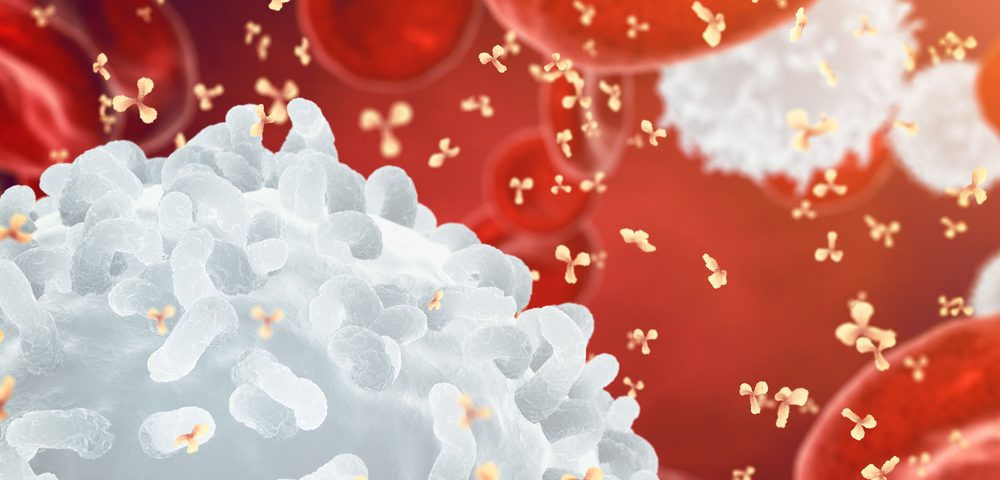Approximately 17% of juvenile idiopathic arthritis (JIA) patients treated with biologic agents develop anti-drug antibodies (ADAbs) that can be associated with treatment failure and adverse events, a review study shows.
Applying strategies to predict, prevent, detect, and manage ADAbs production may help improve care and outcomes in this young population, researchers suggest.
The study, “Immunogenicity of biologic agents in juvenile idiopathic arthritis: a systematic review and meta-analysis,” was published in the journal Rheumatology.
Development and approval of biologic therapies has significantly improved outcomes for children and adolescents affected by JIA. However, up to 50% of these patients do not respond to initial treatment with biologic agents; the treatment loses effectiveness over time, or they experience treatment-related adverse events that cause them to stop taking the therapy.
Studies in adult patients treated with biologic therapies have revealed that primary and secondary therapy failure, as well as hypersensitivity reactions, are often related to ADAbs production. These antibodies may directly block the activity, or change the stability and clearance, of the therapeutic agent.
“The presence of ADAbs may also affect clinical efficacy and safety of biologic therapies in JIA patients. However, knowledge on ADAbs in JIA remains scarce and guidelines on the detection and management of immunogenicity do not exist,” the researchers wrote.
To shed light on this issue, researchers at the University Medical Centre Utrecht in the Netherlands reviewed clinical data available on the outcomes of JIA patients treated with biologic therapies.
They reviewed a total of 28 previously published reports, including data from 26 clinical studies and 2,354 JIA patients. The biologic agents administered in these studies were etanercept (sold as Enbrel, among other names), infliximab (Remicade, among others), adalimumab (Humira, among others), Simponi (golimumab), Actemra (tocilizumab), Orencia (abatacept), Kineret (anakinra), Ilaris (canakinumab), and Arcalyst (rilonacept).
ADAbs prevalence varied considerably among studies, ranging from 0% to 82%, with an overall pooled prevalence of 16.9% in the JIA population.
Patients were found to be positive for ADAbs against many of the available agents within the first eight to 12 weeks of therapy, and the prevalence of ADAbs increased over time. In contrast, treatment with Simponi and Arcalyst was not associated with ADAbs production, and only one patient treated with Ilaris was reported to persistently test positive for ADAb; that condition resolved by itself after continued therapy.
Interestingly, data collected from six studies that evaluated the impact of adalimumab and methotrexate showed that the addition of this steroid therapy reduced by 67% the risk of ADAbs production.
Although some cases of etanercept therapy were associated with ADAbs induction, none were reported to influence treatment outcome and failure. Similarly, studies on Orencia and Arcalyst did not find an association between the presence of ADAbs and treatment failure.
In contrast, infliximab’s efficacy was found to be affected by ADAbs. While clinical improvements were achieved by 79% of treated patients who did not develop ADAbs, a positive response was reported in 69% of infliximab-treated patients who developed ADAbs.
The presence of ADAbs after adalimumab therapy was also associated with increased median disease activity scores and significantly lower therapy concentrations. Adalimumab treatment was also found to be associated with significantly more severe uveitis (eye inflammation) in patients with JIA-associated uveitis. Still, two adalimumab studies did not observe an association between the presence of ADAbs and treatment failure.
The “neutralizing potential of antibodies to infliximab or adalimumab was not determined,” the researchers reported.
Approximately 46% of patients treated with Simponi were found to be positive for neutralizing ADAbs. In addition, Actemra- and Kineret-induced neutralizing ADAbs were associated with a lack of treatment efficacy.
All antibodies induced by treatment with Ilaris lacked neutralizing potential, and none of the ADAb-positive patients experienced treatment failure.
Further analyses revealed that the presence of ADAbs were generally associated with a higher incidence of infusion adverse reactions and other adverse immune-mediated events, including anaphylactic reactions, which are serious, life-threatening allergic reactions.
“Although prevalence of ADAbs within studies generally increased with longer treatment duration, ADAbs appeared transient in most patients,” the researchers wrote.
“Nevertheless, the presence of antibodies against biologic agents was associated with primary failure, secondary failure or hypersensitivity-associated events, which was most evident in studies of infliximab and adalimumab,” they said.
Additional studies are still necessary to explore the potential benefit of strategies to reduce the levels of neutralizing antibodies while receiving biological agents, or of reduced doses to prevent ADAbs production, the team said.
Rather than switching to a second biologic agent — which can potentially result in reduced effectiveness — these alternative approaches could help patients achieve a better outcome.
“Strategies to prevent the development of ADAbs and to maintain or restore clinical efficacy after ADAb development … can potentially improve treatment outcomes and lead to a more personalized treatment with biologic therapies,” the researchers concluded.

